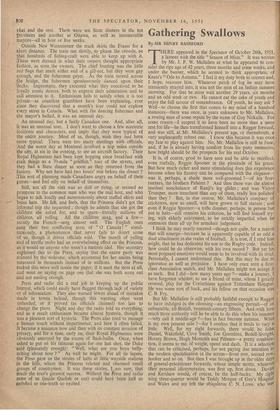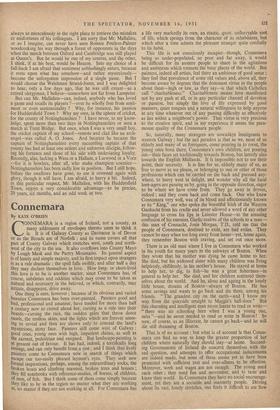Gathering Swallows
By SIR HENRY BASHFORD
THERE appeared in the Spectator of October 26th, 1951, a lament with the title "Season of Mists." It was written by Mr. J. P. W. Mallalieu at what he appeared to con- sider the ripe age of 42 years, three months and some weeks, and under the banner, which he seemed to think appropriate, of Keats's "Ode to Autumn." I feel it my duty both to correct and, I hope, reassure him. Whatever patch of fog he may have transiently strayed into, it was not the mist of an Indian summer morning. For that he must wait another 29 years, six months and an odd week or two. He cannot eat the cake of youth and enjoy the full savour of remembrance. Of youth, he may ask ? Well—to choose the first that comes to my mind of a hundred instances—there was once, in years unknown to Mr. Mallalieu, a rowing man of some repute by the name of Guy Nickalls. For some reason—I suspect it to have been no more than a mere zest for life—he then transformed himself into a Rugger forward, and was still, at Mr. Mallalieu's present age, or thereabouts, a very unpleasantly robust one. I know this because it was Once my fate to play against him. No, Mr. Mallalieu is still in June, and, if he is already having comfort from his puny memories, bow bright should be the prospects for his real October.
It is, of course, good to have seen and be able to recollect, even ruefully, Reggie Spooner in the plenitude of his grace. But how much richer and more stimulating does this experience become when his fluency can be compared with the elegance— was it, perhaps, a shade more well-groomed ?—of his fore- runners, the brothers Palairet ? And then there was the almost insolent nonchalance of Ranji's leg glides ; and was Victor Trumper, more trenchant than any of them, really less polished than they ? But, in due course, Mr. Mallalieu's company of cricketers, now so small, will have grown to full stature ; and even if Reggie Spooner—a trifle dimmer, perhaps, in person but not in halo—still remains his criterion, he will find himself try- ing, with elderly enjoyment, to be strictly impartial when be summon's them all up for armchair judgement.
I think he may nearly succeed—though not quite, for a reason that will emerge—because he is apparently capable of so odd a dual attachment in the realm of football. It is true, if I read him aright, that he has dedicated his son to the Rugby code. Indeed, how could he do otherwise, with his own record ? But yet his most poignant emotions would seem to be involved with its rival. Personally, I cannot understand this. But this may be due to ignorance as well as prejudice. I have only once seen a fir,t- class Association match, and Mr. Mallalieu might not accept it as such. But I did—how many years ago ?—make a journey. I have forgotten whither, to see a friend of mine, whom I greatly revered, play for the Corinthians against Tottenham Hotspur. He was some sort of back, and his fellow on that occasion was C. B. Fry.
But Mr. Mallalieu is still probably faithful enough" to Rugger to have indulged in the choosing—an engrossing pursuit—of an unbeatable, all-British, twentieth-century fifteen. And.with hoW much more authority will he be able to do this when his summer —why call it middle-age ?—has in fact become autumn. What is my own present side ?—for I confess that it tends to vary a little. Well, for my eight forwards, there would be John Daniel, Wakefield, Cove Smith, Joe Greenlees, Bedell-Sivright, Horsey Brown, Hugh Monteith and Pillman—a pretty combina- tion, it seems to me; Of weight, speed and dash. It is a selection that can be criticised, perhaps, for not paying due attention la the modern specialisation in the scrum—front row, second rovv, hooker and so on. But then I was brought up in the-older daYa of general-practitioner forwards, whose simple motto, whatevei their personal idiosyncrasies, was first up, first down. Davies and Kershaw would, of course, be the half-backs. My ribt wing three-quarter would be Teddy Morgan of Guy's Hospital and Wales and nav left the ubiquitous C. N. Lowe, who viO always so miraculously in the right place to retrieve the mistakes or misfortunes of his colleagues. I am sorry that Mr. Mallalieu, or so I imagine, can never have seen Ronnie Poulton-Palmer woodcocking his way through a forest of opponents in the days when the match between Oxford and Cambridge was still played at Queen's. But he would be one of my centres, and the other, think, if at his best, would be Heaton. Into my choice of a full-back I am afraid that sentiment unblushingly enters, because it rests upon what has somehow—and rather mysteriously— become the unforgotten impression of a single game. But I would choose the Welshman Strand-Jones, and I was delighted to hear, only a few days ago, that he was still extant—as a retired clergyman, I believe—somewhere not far from Lampeter.
But can Mr. Mallalieu—can, indeed, anybody who has loved a game and recalls its players ?—ever be wholly free from senti- ment or even sentimentality ? Why, for instance, his passion for Huddersfield Town ? Why my own, in the sphere of cricket, for the county of Nottinghamshire? I have never, to my know- ledge, spent more than two days in Nottinghamshire or seen a match at Trent Bridge. But once, when I was a very small boy, the cricket captain of my school—remote and clad like an arch- angel—was called A. 0. Jones. And because he became the captain of Nottinghamshire every succeeding captain of that county has had at least one ardent and unknown disciple, follow- ing his fortunes and those of his side with undeviating loyalty. Recently, alas, lacking a WaSs.or a Hallam, a Larwood or a Voce —for it is bowlers, after all, who make champion counties— Nottinghamshire has been sadly low in position. But I still hope, before the swallows have gone, to see it crowned again with glory, though it will have, I am afraid, to hurry a bit. Indeed, in this particular respect, Mr. Mallalieu, with his Huddersfield Town, enjoys a very considerable advantage—to be precise, 29 years, six months, and an odd week or two.















































































 Previous page
Previous page